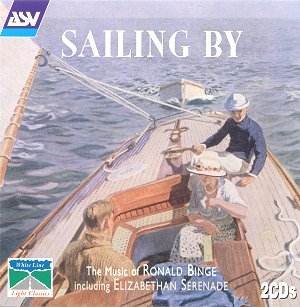Collection
Sailing By: The Music of Ronald BINGE
 Various
Various
 ASV CD WLZ
2 CDs
[2hrs 6 mins]
ASV CD WLZ
2 CDs
[2hrs 6 mins]

CD1 - Elizabethan Serenade; The Watermill;
Saxophone Concerto; Miss Melanie; Man in a Hurry; Saturday Symphony.
CD2 - Sailing By; Give Me a Ring; I Like Your Smile; Perhaps I'm Young; A
Star is Born; Morning Light; I Sent You Roses; Waiting for the Moonlight
When You Are Young; Tango Corto; At the End of the Day; Under the Sun;
Butterflies; Homeward; The Last of the Clan; Inamorata; Autumn Dream; The
Look in Your Eyes; There's a Light in Your Eyes; Candles on the Table; What
do you Know?; The Sound of Music is Everywhere; Fugal Fun; The Moon Looks
Down; Farewell Waltz.
Ronald Binge was one of the many talents of 20th Century British
Light Music. Born in Derby in 1910, his early studies in harmony and counterpoint
were halted because he had to work as an organist accompanying silent films
at a local cinema. In this capacity Binge began to learn basic orchestration.
1931 found him as pianist with an orchestra in Great Yarmouth but his big
break came in 1935 when he was engaged by Mantovani to write arrangements
for his newly-formed Tipica Orchestra. Binge's association with Mantovani
lasted into the 1950s, when he created the famous 'cascading strings' effect
which helped to sell millions of LPs world-wide.
Ronald Binge has composed and orchestrated for the West End Stage and for
films as well as his many own compositions. His film credits include:
Desperate Moment, The Runaway Bus, and Our Girl
Friday.
CD1 includes probably his biggest hits: the lovely lilting
Elizabethan Serenade; the vivid pastoral evocation
that is The Watermill; the sophisticated and coquettish
Miss Melanie with its unique string strumming;
and the blasé jazzy scurrying of Man in a
Hurry.
Ronald Binge himself conducts the South German Radio Orchestra in two of
his more serious and extended works. The Saxophone
Concerto (soloist Aage Voss) begins portentously before relaxing
into a more playful and romantic mood. Its second movement has quieter, dreamy
material and the finale returns to the exuberant - and a high-stepping march.
There is much here to remind one of Eric Coates' Saxo-Rhapsody but, alas,
without the supreme magic of that exquisite composition. Saturday
Symphony is fun - a celebration of the day off. The
first movement is playful, quirky and liberating. There is a brash jazzy
influence and a few pieces of darker material floating about (a visit to
the cinema?) The second movement reminds one of Shostakovich and Prokofiev
and there is a Neapolitan flavour too in its colour and vivacity - a hint
of Gershwin too. The complex Lento is soothing pastoral but with skittish
rhythms twisting ripples over its predominantly calm surface. Breezes fluctuate
and perhaps there is some romance turning to stormy passion -- and something
nautical too à la Vaughan Williams? The last movement is another exercise
in the cheeky and quirky, with brass bands honoured together with some
sentimentality and mischief; but there is also some serious classical order
and perhaps Saturday ends with a visit to the local Palais de Dance?
CD2 comprises 25 short items. I have to say that I cannot recommend this
second disc. Much of the music is too dated and now sounds too blasé
to take seriously. Many of the numbers have a tediously simple basic rhythmic
beat that irritates. A number including, 'When You Are Young' 'Under the
Sun' and 'Homeward' have an odd trotting rhythm and their orchestrations
seem to suggest that they could have been used to score western films. The
few numbers that had the cascading string effect left me cold and I could
not even get very excited by the title number 'Sailing By' although it is
a pleasant enough little piece with quite a charming tune. Walter Weller
and his orchestra play most of the numbers in somnambulistic fashion and
I wonder if these pieces are really more for dancing to than for listening.
It was with considerable relief that I got to number 24 'Fugal Fun' played
with vivacity and panache by Orchestra Raphaele conducted by Heinz Hotter.
Ian Lace
CD1
 CD2
CD2

![]()
![]()
![]()
![]()
![]()
![]()
![]()
![]()
![]()
![]()
![]()
![]()
![]()
![]()
![]()
![]()